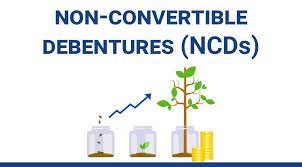Invest In Non-Convertible Debentures For Fixed Returns

When it comes to investing in fixed-income securities within the Indian financial market, Non-Convertible Debentures (NCDs) stand out as a significant option for conservative investors. Compared to highly volatile equity shares, NCDs can provide more predictable returns.
Non-Convertible Debentures are essentially a form of debt instrument issued by companies, primarily for raising long-term capital. Unlike convertible debentures, NCDs cannot be converted into equity shares at a later stage. Instead, they remain as fixed-income instruments until their maturity date, making them an attractive choice for those seeking stable returns.
Understanding Non-Convertible Debentures
Non-Convertible Debentures (NCDs) are fixed-income instruments that carry a promise of fixed periodic payouts in the form of interest to the investors. These are issued by corporations and have specific time frames and interest rates. The interest can be paid monthly, quarterly, semi-annually, or annually based on the terms agreed upon.
Features of NCDs:
1. **Fixed Tenure**: The time frame is specified at the time of issuance varying from one year to up to 10 or 15 years.
2. **Interest Payouts**: Regular interest rates, which can be either fixed or floating.
3. **Credit Rating**: Assessed by credit rating agencies. A higher rating indicates lower credit risk.
Interest Rates and Calculations
To understand how earnings from NCDs work, let's consider a hypothetical NCD offering an annual interest rate of 9% for 5 years. Suppose you invest INR 10,00,000.
Interest Payout:
- Annual interest = Principal * Interest Rate
- Annual interest = 10,00,000 * 9/100 = INR 90,000
If the interest is paid semi-annually (twice a year), each interest payout would be:
- Semi-annual interest = 90,000 / 2 = INR 45,000
Hence, over five years, you would receive:
- Total interest payout = 90,000 * 5 = INR 4,50,000
Your total earnings would be the principal plus the total interest payout:
- Total earnings = 10,00,000 + 4,50,000 = INR 14,50,000
Comparison with Equity Shares
Equity shares represent ownership in a company, and their returns are usually realized through capital appreciation and dividends. While equity investing can offer higher returns, it comes with substantial risk due to market volatility. Unlike NCDs, the returns on equity shares are not fixed or guaranteed. Instead, they depend on market performance, company profits, and broader economic conditions.
Example:
Consider purchasing equity shares worth INR 10,00,000 in a diversified portfolio. If the market value rises by 12% in a year, your investment could grow to:
- Value after one year = 10,00,000 * 1.12 = INR 11,20,000
Conversely, if the market declines by 5%, the value would decrease to:
- Value after one year = 10,00,000 * 0.95 = INR 9,50,000
Equities can essentially provide higher returns, but the risk of loss also exists, unlike NCDs, where the interest income is more predictable.
Pros and Cons of Investing in NCDs
Investors should weigh the advantages and disadvantages of Non-Convertible Debentures before allocating their funds.
Pros:
1. **Guaranteed Returns**: NCDs offer fixed returns as compared to the fluctuating stock market.
2. **Regular Income**: Ideal for investors seeking periodic income.
3. **Low Risk**: Generally, lower risk if dealing with high credit-rated debentures.
4. **Diversification**: Acts as a good diversification tool against the high volatility of equity markets.
Cons:
1. **Interest Rate Risk**: NCDs are prone to interest rate risks. If market interest rates rise, the locked-in rates of NCDs might seem less attractive.
2. **Credit Risk**: If the issuer defaults, investors risk losing their capital.
3. **Liquidity Issues**: NCDs might not be as liquid as stocks.
4. **Taxation**: The interest income from NCDs is taxable according to the investor's tax bracket.
Investing in NCDs: Key Considerations
1. **Issuer’s Credit Rating**: Always check the credit rating of the issuing company through agencies like CRISIL, CARE, or ICRA. Higher ratings suggest lower risk.
2. **Interest Payout Frequency**: Choose debentures according to your income needs – whether you prefer monthly, quarterly, or annual payouts.
3. **Market Conditions**: Evaluate the prevailing market interest rates and compare them with the offered debenture rates.
4. **Unforeseen Events**: Have a thorough understanding of the potential risks and prepare contingencies.
Conclusion
Non-Convertible Debentures offer a viable investment option for those seeking stable and fixed income over a definite period. They are an investment choice that can serve as a counterbalance to the high-risk, high-reward nature of equity shares.
Disclaimer
It is imperative to take all factors into consideration and perform due diligence before investing. Our discussion here does not constitute investment advice. Investors must evaluate the pros and cons and consult with financial advisors to carefully gauge the risk and security of investing in the Indian stock market through various instruments like NCDs.
Thus, Non-Convertible Debentures can indeed be an important addition to a diversified investment portfolio, providing stability and predictable returns while balancing the uncertainty associated with equity shares and other market-linked investment instruments.
What's Your Reaction?




















